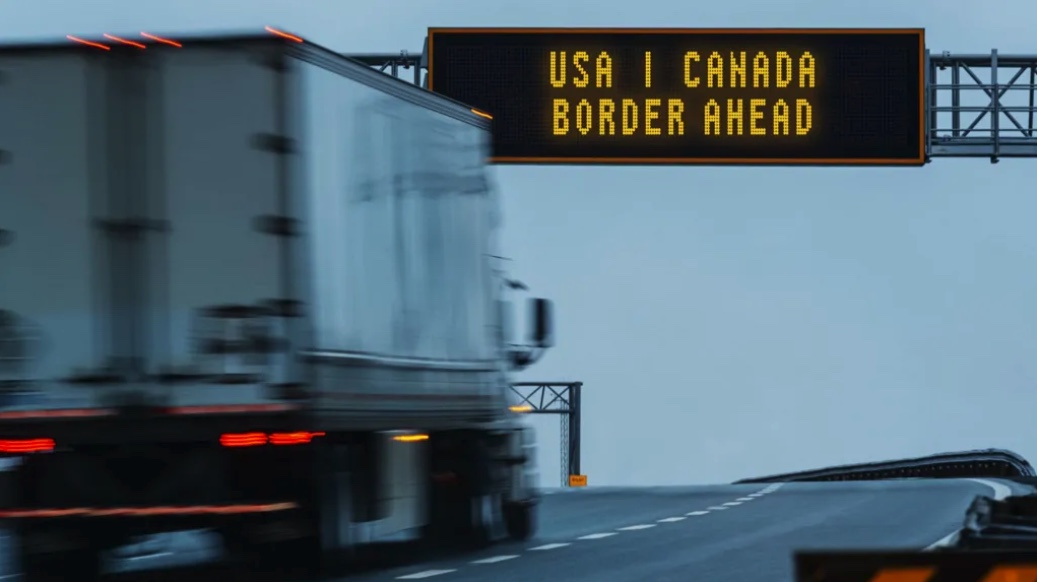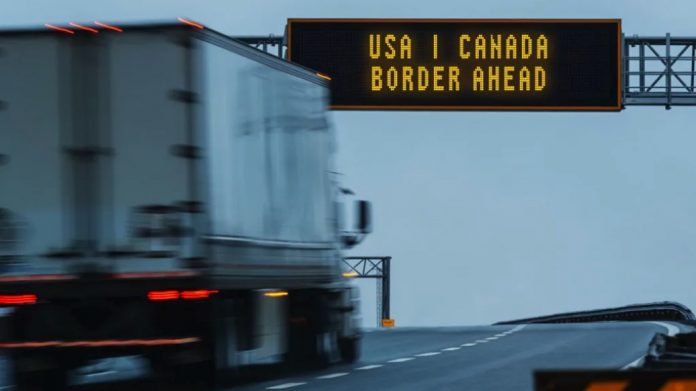แคนาดาได้ให้คำมั่นว่าจะดำเนินมาตรการรักษาความปลอดภัยชุดใหม่ที่ครอบคลุมบริเวณชายแดนติดกับสหรัฐฯ รวมถึงการเสริมสร้างการเฝ้าระวัง และการจัดตั้ง “หน่วยปฏิบัติการพิเศษ” ร่วมกันเพื่อจัดการกับอาชญากรรมข้ามชาติ
คำมั่นดังกล่าวมีขึ้นหลังจาก โดนัลด์ ทรัมป์ ว่าที่ประธานาธิบดีสหรัฐฯ ขู่จะเรียกเก็บภาษี 25% ต่อสินค้าจากแคนาดา หากแคนาดาไม่ควบคุมการไหลเวียนของผู้อพยพผิดกฎหมายและยาเสพติดข้ามพรมแดน
นักเศรษฐศาสตร์เตือนว่าภาษีดังกล่าวอาจส่งผลกระทบร้ายแรงต่อเศรษฐกิจของแคนาดา
โดยในการแถลงรายละเอียดของแผนดังกล่าว รัฐมนตรีว่าการกระทรวงการคลังและกิจการระหว่างรัฐบาลของแคนาดา ประกาศว่ารัฐบาลกลางจะจัดสรรงบประมาณ 1.3 พันล้านดอลลาร์แคนาดา (ประมาณ 900 ล้านดอลลาร์สหรัฐฯ หรือ 700 ล้านปอนด์) สำหรับดำเนินการ
มาตรการเหล่านี้ “จะช่วยปกป้องพรมแดนของเราจากการลักลอบนำยาเสพติดผิดกฎหมายและการอพยพที่ไม่ได้รับอนุญาต ในขณะเดียวกันก็ยังคงรักษาการไหลเวียนของผู้คนและสินค้าที่เป็นหัวใจของความรุ่งเรืองในอเมริกาเหนือ” โดมินิก เลอบลัง รัฐมนตรีกล่าวเมื่อวันอังคาร
แผนดังกล่าวประกอบด้วย 5 เสาหลัก ได้แก่ การขัดขวางการค้าฟีนทานิล การจัดหาเครื่องมือใหม่ให้แก่หน่วยบังคับใช้กฎหมาย การประสานงานกับหน่วยงานบังคับใช้กฎหมายของสหรัฐฯ เพิ่มการแบ่งปันข้อมูล และการจำกัดการจราจรที่ชายแดน
มาตรการเหล่านี้รวมถึงข้อเสนอในการจัดตั้งหน่วยเฝ้าระวังทางอากาศที่ประกอบด้วยเฮลิคอปเตอร์ โดรน และหอคอยเฝ้าระวังเคลื่อนที่ในพื้นที่ระหว่างจุดผ่านแดน
รัฐบาลยังจัดสรรงบให้สำนักงานบริการชายแดนแคนาดา (Canada Border Service Agency) ฝึกสุนัขตรวจจับยาเสพติดเพิ่มเติม และจัดหาเครื่องมือตรวจจับใหม่สำหรับจุดผ่านแดนที่มีความเสี่ยงสูง
นอกจากนี้ เลอบลังยังได้ให้รายละเอียดเพิ่มเติมเกี่ยวกับ “หน่วยปฏิบัติการพิเศษร่วม” ระหว่างหน่วยงานของแคนาดาและสหรัฐฯ โดยระบุว่าหน่วยนี้จะประกอบด้วย “การสนับสนุนในช่วงที่มีปฏิบัติการเร่งด่วน หน่วยเฉพาะทางสำหรับยาสังเคราะห์ การขยายกำลังร่วมปฏิบัติการ การจัดตั้งหน่วยบังคับใช้กฎหมายพิเศษระดับทวิภาคี และการพัฒนาศักยภาพและโครงสร้างพื้นฐานปฏิบัติการใหม่”
แผนดังกล่าวสอดคล้องกับข้อกังวลที่ทรัมป์เปิดเผยต่อสาธารณะในช่วงหลายสัปดาห์ที่ผ่านมา ได้แก่ การไหลเวียนของฟีนทานิลและผู้อพยพผิดกฎหมายเข้าสู่สหรัฐฯ
ข้อมูลจากหน่วยลาดตระเวนชายแดนสหรัฐฯ ระบุว่า จำนวนผู้ข้ามพรมแดนระหว่างสหรัฐฯ และแคนาดามีจำนวนต่ำกว่าพรมแดนทางใต้มาก เช่นเดียวกับปริมาณฟีนทานิลที่ถูกยึดได้
ขณะนี้เม็กซิโกก็กำลังเผชิญกับคำขู่เรียกเก็บภาษี 25% เช่นกัน
เลอบลังกล่าวว่า เขาและเจ้าหน้าที่คนอื่น ๆ ได้มีการหารือเบื้องต้นกับ ทอม โฮแมน เจ้าหน้าที่ชายแดนของทรัมป์ที่เพิ่งเข้ามารับตำแหน่งเกี่ยวกับแผนใหม่นี้
“ผมมีกำลังใจจากการสนทนาครั้งนั้น” เขากล่าว
เลอบลังยังเข้าร่วมการประชุมเมื่อเดือนที่แล้วระหว่างนายกรัฐมนตรีจัสติน ทรูโด และทรัมป์ ที่มารา-ลาโก ซึ่งการประชุมดังกล่าวถูกมองว่าเป็นความพยายามที่จะหลีกเลี่ยงการเรียกเก็บภาษี
การประกาศครั้งนี้เกิดขึ้นในวันแรกที่เลอบลังดำรงตำแหน่งรัฐมนตรีว่าการกระทรวงการคลังแคนาดา โดยเขาเป็นพันธมิตรคนสำคัญของทรูโด และได้รับการแต่งตั้งอย่างเร่งด่วนเมื่อวันจันทร์ที่ผ่านมา หลังจากที่คริสเทีย ฟรีแลนด์ รัฐมนตรีว่าการกระทรวงการคลังและรองนายกรัฐมนตรีลาออกอย่างกะทันหัน
ฟรีแลนด์ลาออกจากตำแหน่งด้วยจดหมายเปิดผนึกถึงทรูโด โดยระบุถึงความไม่ลงรอยกันในเรื่องการใช้จ่ายและ “แนวทางที่ดีที่สุดสำหรับอนาคตของแคนาดา”
การลาออกอย่างกะทันหันของเธอได้เพิ่มแรงกดดันต่อรัฐบาลเสียงข้างน้อยของทรูโดที่อ่อนแออยู่แล้ว
เมื่อวันอังคารที่ผ่านมา ในสุนทรพจน์ต่อสมาชิกพรรคในการประชุมวันหยุดของพรรคเสรีนิยม ทรูโดได้กล่าวอย่างเด็ดขาดว่า “การเมืองมีทั้งวันที่ยากลำบากและความท้าทายใหญ่หลวงเสมอ”
“แต่ทีมนี้ไม่ได้ครองสถิติเสียงข้างน้อยที่ยาวนานที่สุดในประวัติศาสตร์แคนาดาเพราะเราหลีกเลี่ยงช่วงเวลาที่ท้าทาย เราทำงานหนักไม่ว่าจะง่ายหรือยากแค่ไหน”
Canada announces new border rules following Trump tariff threat

Canada has promised to implement a set of sweeping new security measures along the country’s US border, including strengthened surveillance and a joint “strike force” to target transnational organised crime.
The pledge follows a threat from President-elect Donald Trump to impose, when he takes office in January, a 25% tariff on Canadian goods if the country does not secure its shared border to the flow of irregular migrants and illegal drugs.
Economists say such tariffs could strike a blow to Canada’s economy.
Announcing details of the plan, Canada’s minister of finance and intergovernmental affairs said the federal government would devote C$1.3bn ($900m; £700bn) to the plan.
The measures “will secure our border against the flow of illegal drugs and irregular migration while ensuring the free flow of people and goods that are at the core of North America’s prosperity”, Minister Dominic LeBlanc said on Tuesday.
The five pillars of the plan cover the disruption of the fentanyl trade, new tools for law enforcement, enhanced coordination with US law enforcement, increased information sharing and limiting traffic at the border.
They include a proposed aerial surveillance task force, including helicopters, drones and mobile surveillance towers between ports of entry.
The government is also giving the Canada Border Service Agency funds to train new dog teams to find illegal drugs, and new detection tools for high-risk ports of entry.
And LeBlanc provided further detail on the so-called “joint strike force” for Canadian and US authorities, saying it would include “support in operational surges, dedicated synthetic drug units, expanded combined forces, special enforcement units, binational integrated enforcement teams, and new operational capacity and infrastructure”.
The new plan appears to correspond to the concerns publicly disclosed by Trump in recent weeks: the flow of fentanyl and undocumented immigrants into the US.
The number of crossings at the US-Canada border is significantly lower than at the southern border, according to US Border Patrol data on migrant encounters, as is the amount of fentanyl seized.
Mexico is also facing a 25% tariff threat.
LeBlanc said he and other officials had a “preliminary” conversation with Trump’s incoming “border tsar” Tom Homan about the new plan.
“I’m in encouraged by that conversation,” he said.
LeBlanc was present at a meeting last month between Prime Minister Justin Trudeau and Trump at Mar-a-Lago, a trip reportedly meant to head-off the levy.
The announcement comes on LeBlanc’s first day as Canada’s finance minister.
The longtime ally to Trudeau was hastily sworn in on Monday after the surprise resignation of Chrystia Freeland, who served as both finance minister and deputy prime minister.
Freeland quit her posts with a scathing open letter to Trudeau in which she outlined disagreements she had with him on spending and “the best path forward for Canada”.
Her abrupt exit from cabinet has put additional strain on Trudeau’s weakened minority government.
On Tuesday, in a speech to party faithful at a Liberal holiday event, a defiant Trudeau said there are “always tough days and big challenges” in politics.
“But this team doesn’t hold the record for the longest minority in Canadian history because we shy away from these moments, we put in the work, whether it’s easy or hard.”
By Holly Honderich, BBC News

















